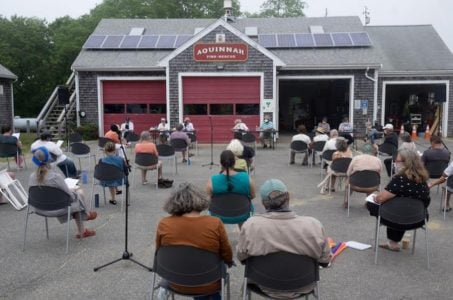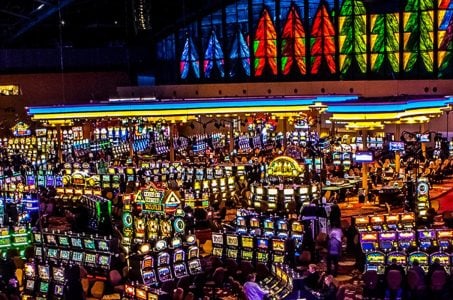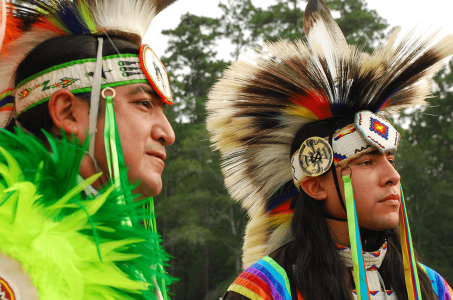Mashpee Wampanoag Look to Congress, Court Appeals after Ruling on Massachusetts Casino
Posted on: February 27, 2020, 08:30h.
Last updated on: February 28, 2020, 08:05h.
The Mashpee Wampanoag have lost a key appellate case related to a stalled tribal casino planned for Taunton, Massachusetts, located in the southeastern section of the state. The controversy has led to multiple court cases and Congressional debate.

On Thursday, a three-judge panel representing the US Court of Appeals for the First Circuit released a decision which chose not to overturn a district court ruling by Judge William Young. That ruling held the government should never have let 321 acres of land in Mashpee and Taunton be held in trust for the tribe, according to the Boston Globe.
The highly anticipated ruling supports the view the Mashpee Wampanoag were not considered “Indian,” given the rules spelled out in the 1934 Indian Reorganization Act.
Now, the tribe can ask the entire appeals court to review the case, or the tribe can appeal to the US Supreme Court. Another option is for Congress to pass legislation sympathetic to the tribe, though it is unclear how the Senate will respond to any request.
The groundbreaking on the $1 billion gaming property, initially called First Light Resort and Casino, took place in 2016. It basically has been tied up in litigation since then.
The Mashpee Wampanoag got another blow when judges ruled in favor of residents who opposed the casino. Mass Gaming and Entertainment, led by Neil Bluhm, funded the neighbors’ court action, the Globe said. Mass Gaming wants to build a commercial casino in Brockton, located near Boston.
The tribe also has another case regarding the dispute now pending in federal court in Washington, DC. “The decision [on Thursday] has no impact on the Mashpee Wampanoag tribe’s pending litigation in Washington, D.C.,” the tribe said in a statement. “Its land will not be taken out of trust as a result of today’s decision.”
Tribe Says It Will Continue the Fight
In response to Thursday’s ruling, Mashpee Wampanoag Tribal Chairman Cedric Cromwell said in a statement, “We will continue to fight, as our ancestors did, to preserve our land base, our culture, and our spiritual connection to our homelands.”
Attorney David Tennant, who represents Taunton residents, told the Globe his clients are “vindicated” with the ruling. The district and appellate judges acted in ways that “courts are supposed to … which is to apply statutes as written and to do it without favor or bias,” Tennant said.
Joe Baerlein, a spokesman for Mass Gaming, further told the Globe the appeals ruling “clears the way for a commercial resort casino” in the region.
But the Mashpee Wampanoag pledge to also “continue its plea that the United States Congress take action…. The tribe will not give up the fight to protect its lands.”
The tribe also contends much of the case relates to the legal meaning of two words found in relevant laws. They are “now” and “such.”
In 2018, the federal Department of the Interior reversed a decision to hold the land in trust after a federal lawsuit successfully challenged the process. The DOI agreed the tribe did not qualify because it was not under federal jurisdiction when the Indian Reorganization Act passed in 1934.
Genting, based in Malaysia, was supplementing the Mashpee’s finances. But it eventually pulled its support, leaving the tribe $500 million in debt.
The Mashpee Wampanoag’s leadership has collaborated with local members of Congress to enact sympathetic legislation.
So far, MGM Springfield has opened in Springfield and Encore Boston Harbor opened in Everett, near Boston. The Massachusetts Gaming Commission can approve a third commercial casino in Southeastern Massachusetts.
Massachusetts Gaming Market Seen as Saturated
But the proposed tribal casino is seen as more competition to a third commercial casino in the region.
Concerns have been voiced that the state’s gambling market is already saturated. Casinos in other New England states are additional competition.
Related News Articles
Most Popular
Mirage Las Vegas Demolition to Start Next Week, Atrium a Goner
Where All the Mirage Relics Will Go
Most Commented
-
Bally’s Facing Five Months of Daily Demolition for Chicago Casino
— June 18, 2024 — 12 Comments -
Chicago Pension Mess Highlights Need for Bally’s Casino
— July 2, 2024 — 5 Comments
















No comments yet